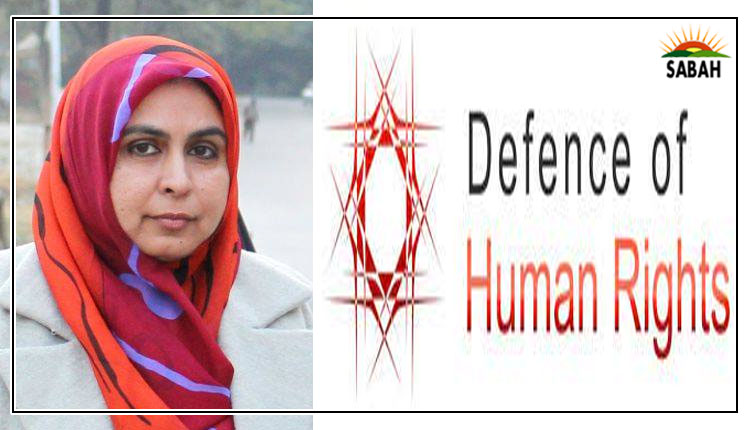Financial support package does not solve the issue of enforced disappearances: Amina Masood Janjua
ISLAMABAD, August 03 (SABAH): Chairperson Defense of Human Rights Pakistan Amina Masood Janjua has said that the financial support package announced by the government is a step toward alleviating the immediate economic hardships faced by families, it does not solve the issue of enforced disappearances. She said that the government must ensure accountability, justice, and the safe return of the missing individuals to their families.
While addressing a press conference at National Press Club Islamabad on Saturday Amina Masood Janjua said that she considers this step encouraging. However, the families of the disappeared must be incorporated as member representatives in the Committee. This should lead to the formation of a Truth and Reconciliation Commission to address the issue comprehensively, providing truth, justice, closure, and compensation in line with international standards.
Amina Masood Janjua said that the families demand safe return of their loved ones. Receiving monetary compensation is not their primary motive. Many have taken this step by the Cabinet as a blow to their self respect and an insult to their struggle for finding truth about their loved ones.
Amina Masood Janjua said that DHR also demands transparency and clarity in the selection for the 5 year long disappearance criteria. She said that why five years restriction has been imposed for grant of the financial package, adding that whether the people went missing prior to five years ago are not present in this world, adding that the government should present clarification. She said that even Rs 50 million could not compensate the human life, adding that the government should try to understand the grief of the families of the missing persons. She said that the joint session of the parliament should immediately be summoned for the approval of the proposed legislation regarding the missing persons’ issue. She said that the missing persons’ commission headed by Justice (retd) Javed Iqbal should immediately be abolished.
According to Defence of Human Rights, as of August 2024, a total of 3,127 cases of enforced disappearances have been registered across Pakistan. Out of these, 1,359 individuals remain missing, 606 have been released due to the efforts of Defence of Human Rights, and 119 have been traced to various jails in the country. Additionally, 124 persons are reported to be languishing in internment centers in the tribal territories.
It is worth mentioning here that the Federal Cabinet approved a support package of five million rupees per family to provide legal and financial assistance to the heirs of missing persons. This announcement was made by Law Minister Azam Nazeer Tarar during a press briefing, following the Cabinet meeting led by Prime Minister Mian Muhammad Shehbaz Sharif.
Azam Nazeer Tarar emphasized that a special committee will be established to determine which families need immediate support. Each eligible family will receive Rupees 5 million, prioritizing cases identified through legal mechanisms. The package aims to alleviate the economic hardships faced by these families, but monetary compensation alone does not address the grave issue of enforced disappearances. It is crucial to recognize that this package is a form of support, not a resolution to the underlying problem.
The quest for justice and accountability continues despite the announcement of the support package. The government has also notified a three-member committee comprising top intelligence officials to assist in the recovery of missing persons, following the Islamabad High Court’s directive in February. Several recommendations from previous cabinet committees on the issue were approved during the caretaker government’s tenure. However, need for transparency in the committee’s functions and the inclusion of family members, irrespective of whether they fall within the five-year limit. Families have the right to know the truth about their loved ones and to hold the perpetrators accountable.
Azam Nazeer Tarar mentioned that more than 2,000 cases have been determined through legal mechanisms, with 1,000 cases prioritized on a first-come, first-served basis, beyond a five-year limit. However, he did not specify the exact number of families that would benefit from the support package. Furthermore, some families refuse to accept the monetary compensation, believing that it would put an end to their struggle for accountability from the state. Families of missing persons continue to demand justice and accountability.
Azam Nazeer Tarar welcomed the cooperation from intelligence agencies, which was noted in the report. He stressed that these agencies also desire the resolution of the issue within a legal framework. However, the involvement of state agencies in enforced disappearances remains a contentious issue, and the government must address this to build trust and ensure justice.
The Law Minister also mentioned other related recommendations, including the establishment of a legal framework, a future strategy to prevent such cases, and necessary instructions to the National Database and Registration Authority (NADRA) to address issues pertaining to the bank accounts and inheritance of missing persons.












